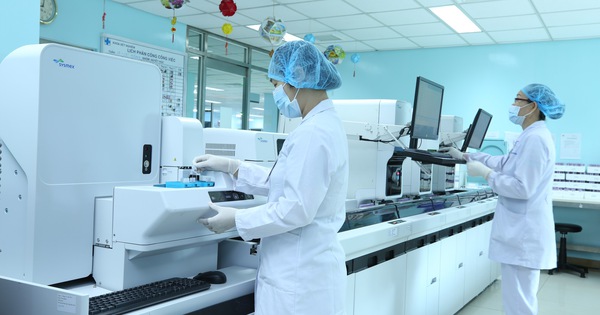Hanoi-Vietnam: Brief information on intermediate-level medical laboratory technology
Recently, the Vietnam Ministry of Labor, War Invalids, and Social Affairs issued Circular 54/2018/TT-BLDTBXH stipulating the minimum knowledge volume and competency requirements for graduates from intermediate and college levels in health and social service sectors.

Hanoi-Vietnam: Brief information on intermediate-level medical laboratory technology - Illustration
Under the regulation of the minimum knowledge volume and competency requirements for graduates of intermediate and college-level medical laboratory technology issued together with Circular 54/2018/TT-BLDTBXH, intermediate-level medical laboratory technology in Vietnam is a field that utilizes modern methods, machinery, and technological equipment to analyze specimens such as blood, urine, fluids, etc. to detect and provide evidence assisting doctors in accurately diagnosing the health condition of service users, meeting Level 4 requirements in the Vietnam National Qualification Framework.
The laboratory work includes: receiving, collecting, or accepting specimens, preparing chemicals, and reagents, preparing instruments, and machinery, performing laboratory techniques, and reviewing, assessing, preserving, and releasing results. The profession is mainly conducted in laboratories of medical facilities, testing centers, from central to local levels, educational institutions specializing in health, agencies/organizations involved in testing, Centers for Disease Control and Prevention, etc.
The working conditions frequently involve direct contact with service users such as patients, patient's relatives, medical staff; chemicals, medical biospecimens, and highly precise equipment. This requires laboratory technicians to grasp professional knowledge firmly, have good communication skills, withstand work pressure, be meticulous, cautious, honest, accurate, and adhere to professional ethics and the law. The output products are test results that require speed, accuracy, and safety.
Intermediate-level medical laboratory technicians in Vietnam possess knowledge of basic sciences, foundation medical sciences, specialized knowledge, and skills to perform tests in the fields of Microbiology-Parasitology; Biochemistry, Immunology; Hematology-Blood Transfusion; Pathological Anatomy, and Cytology. They must have good health, ethical qualities, effective communication skills, high responsibility spirit, cautious and precise demeanor; the ability for self-study, updating and enhancing knowledge, and skills to meet the needs of public health care and protection.
For intermediate-level students, the minimum volume of knowledge is 1,700 hours (equivalent to 60 credits).
Further details may be found in Circular 54/2018/TT-BLDTBXH effective February 10, 2019.
Le Vy
- Number of deputy directors of departments in Vietnam in accordance with Decree 45/2025/ND-CP
- Cases ineligible for pardon in Vietnam in 2025
- Decree 50/2025 amending Decree 151/2017 on the management of public assets in Vietnam
- Circular 07/2025 amending Circular 02/2022 on the Law on Environmental Protection in Vietnam
- Adjustment to the organizational structure of the Ministry of Health of Vietnam: Certain agencies are no longer listed in the organizational structure
- Vietnam aims to welcome 22-23 million international tourists in Vietnam in 2025
-

- Number of deputy directors of departments in Vietnam ...
- 15:04, 05/03/2025
-

- Cases ineligible for pardon in Vietnam in 2025
- 14:43, 05/03/2025
-

- Decree 50/2025 amending Decree 151/2017 on the ...
- 12:00, 05/03/2025
-

- Circular 07/2025 amending Circular 02/2022 on ...
- 11:30, 05/03/2025
-

- Adjustment to the organizational structure of ...
- 10:34, 05/03/2025
-

- Notable new policies of Vietnam effective as of ...
- 16:26, 11/04/2025
-
.Medium.png)
- Notable documents of Vietnam in the previous week ...
- 16:21, 11/04/2025
-
.Medium.png)
- Notable documents of Vietnam in the previous week ...
- 16:11, 02/04/2025
-
.Medium.png)
- Notable new policies of Vietnam to be effective ...
- 16:04, 02/04/2025
-
.Medium.png)
- Notable new policies of Vietnam effective from ...
- 14:51, 21/03/2025
 Article table of contents
Article table of contents
